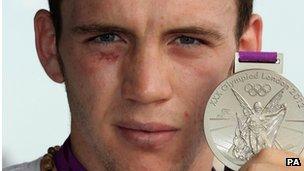Legacy hope after record Welsh medals haul at Olympics
- Published
There are calls for the Olympics legacy to be secured in Wales for the next generation.
Fred Evans's boxing silver on Sunday ensured a record seven Welsh medals in one Games - two more than in Beijing.
But as the Olympics closed, Sport Wales called for an increase in the amount of hours children take part in sports.
Chair Laura McAllister said children needed to be "enthused and engaged" by sport, starting in school.
London 2012 has been a golden Games for Welsh sportsmen and women: Cyclist Geraint Thomas, rower Tom James and teenage taekwondo competitor Jade Jones all topped the podium.
Cardiff welterweight Freddie Evans added to the haul with a silver medal in the boxing, bringing to three the silver medals won by Hannah Mills in the sailing and Chris Bartley in rowing.
Sarah Thomas secured a bronze in the women's hockey, scoring in Great Britain's medal-winning victory over New Zealand.
Prof Laura McAllister, chair of Sport Wales, an ex-Wales international footballer and a member of the UK Sport board, said to develop the next generation of Olympics performers, children should be engaged in five to six hours of sport a week.
She said: "There is a requirement for two hours of PE per week, and virtually all primary schools meet that requirement within the curriculum, but not all secondary schools."
She said it was equally important that this was stretched to include sports out of school and in the community.
"That's where the big challenge lies because in our opinion, and indeed the opinion of all experts, children should be engaged in sport for around five to six hours a week," said Prof McAllister.
"I feel very, very strongly that schools are the most critical arena for our work in sport post-Olympics.
"If children aren't enthused and engaged and excited by sport in schools then there's very little clubs and the governing bodies and the local authorities can do once they move outside that school environment."

Fred Evans won Wales' seventh medal on Sunday
Prof McAllister said it was up to everyone, especially those in education, to create a "culture of sporting exuberance" and she said she would like to see sport made compulsory in schools.
"I think it's absolutely critical that this become mandatory and is imposed in a mandatory manner."
Funding
Ahead of the closing ceremony, Prime Minister David Cameron announced funding for Britain's Olympic sports would be maintained for Rio 2016.
UK Sport, the body that distributes money to Olympic and Paralympic sports, will receive £125m per year.
Prof McAllister said the bulk of help for elite athletes in Wales came from the budget of Sport Wales and lottery funding.
"We're fortunate in having an elite sports strategy that runs to 2016, that is well-funded through lottery money and is supported by the Welsh government.
"Elite athletes don't just emerge. It's so important that you have a really systematic development of our athletes so that we can spot young children at a very, very young age."
Gary Brace, chief executive of the General Teaching Council for Wales, said: "This has got to be a complimentary activity between schools and sports clubs and organisations.
"The school curriculum can provide that experience for all, but the extension has to be, I think through... sports clubs and organisations where you get the specialist coaching."
Meanwhile, First Minister Carwyn Jones has announced a joint welcome home celebration event for Wales' Olympian and Paralympian "heroes" on 14 September.
- Published12 August 2012
- Published12 August 2012